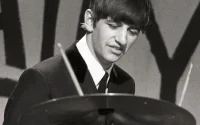Across the Universe’: John Lennon’s most natural anthem
As you drift off to sleep, your muscles relax, your breathing slows, and your mind begins to shut down, drawing a curtain on the day’s activities. At this point, most people surrender to sleep and wake hours later, refreshed by the morning light. However, for musicians like John Lennon, this peaceful recharging is often interrupted by bursts of inspiration as the creative mind refuses to settle down.
After listening to his first wife, Cynthia, “going on and on” about something that irritated him, a series of words floated around in his mind like a prophecy. These weren’t the same lines that would eventually hold the same soothing and psychedelic effect as those in ‘Across the Universe’, but the genesis sparked a sort of “cosmic” composition with lyrics that drifted along more resigned to the symmetry of the universe and its purpose rather than the frustrations caused by a partner.
The spectrum of emotions that humans encounter are all a normal part of existence, as natural as drifting off to sleep or feeling hunger, but frustration and grandeur seem closely linked, especially considering how easily one transitioned into the other during a moment Lennon was thinking about anything but creativity. For starters, the words themselves reflect this very notion: “Words are flowing out like / Endless rain into a paper cup / They slither wildly as they slip / Away across the universe.”Much of Lennon’s life was spent attempting to reconnect with the natural world, likely as a reaction to the turbulence he endured growing up and during his time at the peak of fame. Living in the public eye also proved to be an almost impossible feat, but taking LSD and unravelling the layers that tugged at the broken outer shell of childhood trauma seemed a more natural course of action.
In a way, this is what’s interesting about these first lines and the imagery of rain falling into a paper cup—but the fickleness of Lennon’s own existence makes it seem entirely appropriate. Just as rain is natural and inevitable, like Lennon’s trauma, the paper cup is his being, his vessel, and the only instability that prevents his soul from exploding out into the ether.
Of course, his experience with the natural world also encompasses the many years spent studying Transcendental Meditation under the tutelage of Maharishi Mahesh Yogi, which features in the refrain of ‘Across the Universe’ in the form of the hypnotic chant, “Jai Guru Deva Om”. Perhaps this was why Lennon himself once referred to the song as his greatest lyric, not because it epitomised The Beatles’ attitudes towards the power of the universe and its omnipotence but because it reflected his own battle with breaking free from the restrictions of the physical form.


